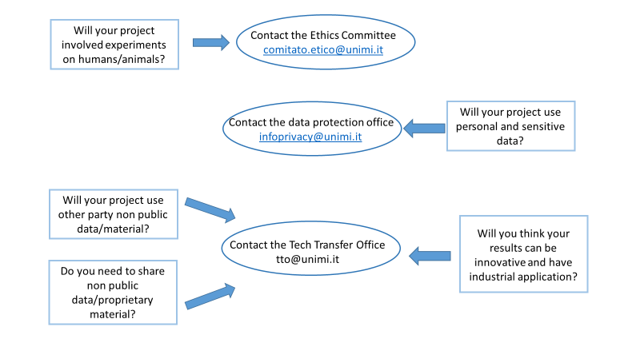What is a DMP?
A Data Management Plan is a structured document that describes what research data is created, how it will be managed during and after the project and the different responsabilities. It enlists the complex of actions that will be taken to produce, analyze, store, preserve and share the data generated by a research.
It is a living document which should be updated whenever the need arises. It is written at the beginning of a research project and it forces the researcher to think about the data he will produce before he has started working on it: thinking about data in advance helps to manage it better.
Planning your DMP
•Check if your funder has a DMP Template: it is mandatory to use your funder’s template. Otherwise, here is HORIZON Europe DMP Template
•Give yourself a complete overview of all your research materials, the data you will collect or create
•Discover if others have already created data that you can reuse: take note if you use data created by others (secondary data), since this brings relevant copyright implications
•Check any kind of restriction you might encounter: use the following scheme

Writing your DMP
1. Data description and collection or re-use of existing data
a. How will new data be collected or produced and/or how will existing data be re-used?
b. What data (for example the kinds, formats, and volumes) will be collected or produced?
2. Documentation and data quality
a. What metadata and documentation (for example the methodology of data collection and way of organising data) will accompany data?
b. What data quality control measures will be used?
3. Storage and backup during the research process
a. How will data and metadata be stored and backed up during the research process?
b. How will data security and protection of sensitive data be taken care of during the research?
4. Legal and ethical requirements, codes of conduct
a. If personal data are processed, how will compliance with legislation on personal data and on data security be ensured?
b. How will other legal issues, such as intellectual property rights and ownership, be managed? What legislation is applicable?
c. How will possible ethical issues be taken into account, and codes of conduct followed?
5. Data sharing and long-term preservation
a. How and when will data be shared? Are there possible restrictions to data sharing or embargo reasons?
b. How will data for preservation be selected, and where will data be preserved long-term (for example a data repository or archive)?
c. What methods or software tools will be needed to access and use the data?
d. How will the application of a unique and persistent identifier (such as a Digital Object Identifier DOI) to each data set be ensured?
6. Data management responsibilities and resources
a. Who (for example role, position, and institution) will be responsible for data management (i.e. the data steward)?
b. What resources (for example financial and time) will be dedicated to data management and ensuring that data will be FAIR (Findable, Accessible, Interoperable, Re-usable)?
Useful information
•Not all DMPs are the same; although they share the same basic features.
• There are some useful tools to help you write your DMP
• Some funding institutions (including universities) may carry out a formal assessment of the DMP that you submit, in some cases giving candidates a grade. UNIMI’s policy on this is to provide support throughout for developing the DMP and to ask candidates to modify their DMP when necessary. Importantly, the DMP support is also available for new versions of the DMP. Therefore, UNIMI does not provide a written assessment of DMPs. At this link you can consult possible DMP evaluation frameworks.
